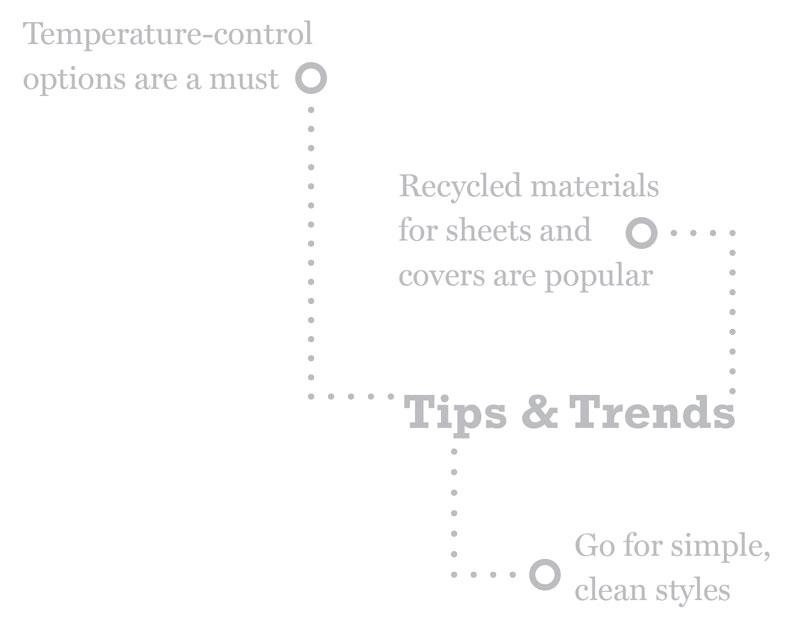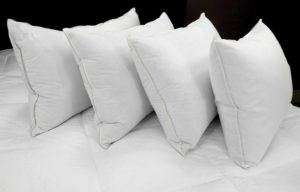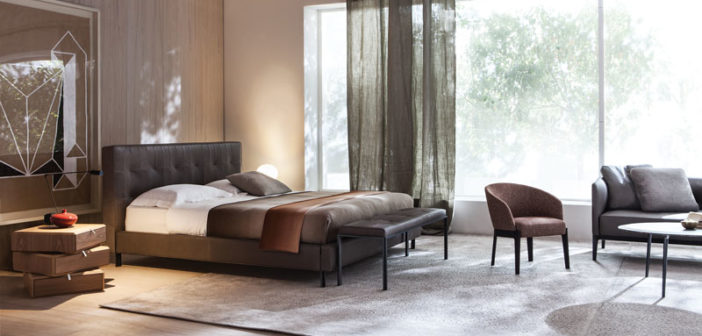 “Guests expect a good night’s sleep when they stay at a hotel—really, it’s what they’re paying for,” said Rick Sequeira, VP of hospitality for Serta Simmons Bedding. Sequeira explained that the hotel bed marks not only the heart of every guestroom, but the foundation for the guest experience.
“Guests expect a good night’s sleep when they stay at a hotel—really, it’s what they’re paying for,” said Rick Sequeira, VP of hospitality for Serta Simmons Bedding. Sequeira explained that the hotel bed marks not only the heart of every guestroom, but the foundation for the guest experience.
“In a social network-driven marketplace, keeping guests happy has never been more important. Today, that includes not just a great bed, but a choice of pillows and cool, comfortable linens and toppers,” he said. “Many of the comforts that guests have at home, they expect to see at a hotel, and they want the bed and everything on it to look comfortable, clean and inviting. Perception is everything in hospitality.”
With sleep being a guest’s main priority, creating this comfortable bed is key. According to Sequeira, hotels understand the power of a good night’s sleep and believe it to be a differentiator in guest satisfaction and loyalty.
“Reviews are hard to ignore. In fact, 55% of travelers said they look for reviews that specifically address sleep quality in a recent TripAdvisor survey,” Sequeira said. “We are a sleep-deprived country. Studies prove it. Experts continue to stress the importance of getting the required amount of sleep in order to avoid serious health issues down the road. But nowhere is the need for a good night’s sleep more important than when you’re a business traveler. Your work performance suffers when sleep suffers. Period.”

rench Heritage’s Passy Wing Eastern Bed evokes a tranquil, yet distinguished feeling, according to the company. It features a peerless-shaped and upholstered headboard. The trim forms the bed rails and foot-board, all supported by distinctive turned feet.
Creating this experience begins with the product. Mark Kelleher, company director for Venus Group, said that today’s guest expects to find a “home away from home” in a hotel room, with personal luxuries readily available. Also important is the cost, which tops as another priority for companies and hotel owners.
“The hospitality industry has unique bedding requirements that are driven by quality, design and perceived guest experiences. These bedding products, while maintaining a lower price, often have very extensive performance requirements to survive industrial laundry processes and guest wear and tear. The price versus quality relationship is always a challenge for the supplier,” Kelleher said.
“Although the price may appear to be more expensive at acquisition, the overall life expectancy of our product and the energy savings during routine processing, including less heat and fewer chemicals used, often realizes a significant reduction in overall operating expenses,” he said.
Using less energy and water bolsters sustainability efforts, which are also at the forefront.
“Our commitment to sustainability starts in the factory with a zero-waste policy, but it’s also about using raw materials that come from repurposed and recycled sources,” Sequeira said.
According to Kelleher, Venus uses recycled polyester in bedding products like sheets and duvet covers to give a new life to plastic water bottles that typically end up in landfills. Venus is also incorporating technology for these purposes.
“Venus is bringing an IoT innovation to market this year that will help our customers reduce energy cost, enhance the guest experience via PaaS technology and enable new revenue streams by increasing guests’ on-property spend,” Kelleher said.
Design trends are also on the rise with nods to sustainability, with hospitality bedding leaning toward more organic, clean looks.

Koni’s cooling mattress cover and pillow protectors are designed for comfort, and are soft, durable and flexible. The copper coiling infused fibers provide a heat-regulated sleep with thermal conductive technology that pulls heat away from the body. In addition, the healing benefits of copper have been linked with pain reduction from arthritis and increased blood circulation.
“Bedding trends today are heading toward a more organic, crisp look—still white, but inviting with textures and depth: small quilted blankets between two top sheets, embroidered accent pillows, matelassé box spring covers fitted snugly and clean,” said Deborah Herman, owner of Fabric Innovations. “The box spring cover will replace every dust ruffle in the industry… They make the bed so new.”
Herman also mentioned that the consumers themselves have the most power when it comes to sustainability. She said that limiting sheets and top-of-bed products to just one wash per stay is key. “All other sustainable issues haven’t been significant because water and energy savings by not washing per stay per guest has been so impactful,” she said.
While all of these companies’ mission is to continue to adapt to industry demands while delivering the perfect night’s sleep to guests—or, at least, a night comparable to one at home—it’s no surprise that the bedding industry will continue to innovate.
“Every single day we think about the future, the next idea. It’s a constant restlessness about how we move to the next level: to consistently deliver products that match a brand’s requirements and exceed guest expectations,” Sequeira said. “Creating brand-defining, exceptional guest sleep experiences is what we’ve been focused on for decades. Innovators never sleep.”


